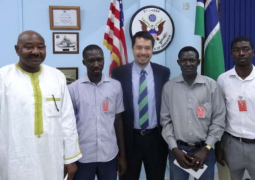The International Monetary Fund office in The Gambia yesterday engaged members of the Gambia Banker’s Association in a briefing session on the newly released report on the IMF’s 2012 Regional Economic Outlook for sub-Saharan
REO is a flagship publication of the IMF, which provides cross-country analysis and spillover effects.
The latest report, published in April this year, among others covers topics relating to Sustaining Growth amid Global Uncertainty; Impact of Global Financial Stress on SSA Financial Systems; SSA’s Natural Resources Exporters: Recent Performance and Policy Challenges.
The second analytical chapter of the REO examines the impact of global financial stresses on SSA’s financial systems in some detail.
SSA’s financial systems have proved to be relatively well insulated from global financial shocks, in large part due to strong domestic funding bases and limited reliance on external financing (especially of the shorter-term variety).
The four hour forum attended by top echelon of the Gambian banks, as well as officials of the International Monetary Fund and other key players in the financial sector, was aimed at providing a forum to critically look at the report, make suggestions, and contributions on the way forward.
Presenting a paper on the topic: “Impact of Global Financial Stress on Sub Saharan Africa Financial System: Regional Economic Outlook for SSA,” the IMF resident representative, Meshack Tunee Tjirongo, said Sub Saharan Africa’s (SSA) banking system have been resilient to the episodes of global turmoil.
According to him, vulnerabilities to ongoing European financial stress are moderate in most SSA countries.
However, “there is no room for complacency,” he told several managing directors of banks attending the forum held at the Kairaba Beach Hotel.
“SSA banking systems have shown so far significant resilience to episodes of global financial stress. There have been three of these episodes, starting from the one associated with collapse of Lehman Brothers investment Bank in 2008, followed later by episodes in 2010 and 2011 related to deteriorating conditions in Europe,” he said.
The IMF’s
Further in his presentation, the IMF official said most banking systems were not materially affected, at least to judge from the evolution of their financial soundness.
“Non performing loans rose and profitability declined, but to levels that did not compromise bank soundness. Moreover, and as it often happens during periods of stress, standard capital adequacy ratios improved. This reflects the fact that banks become more careful and risk- weighted assets grow more slowly than the slowdown in the growth of capital.”
Briefly addressing the forum, the managing director of GTBank, Femi Omotso, said discussing the regional economic outlook for
He said the forum will avail them the great understanding of the environment within which they exist, adding that the deliberations will impact so much on the their enterprise; stakeholders and clients.
He urged and challenged bankers to be prepared to work hard to avoid another economic crisis.
Sirajo Salisu, managing director of the Arab Gambian Islamic Bank (AGIB), on behalf of the
president of the Bankers Association of The Gambia, saluted the IMF for engaging the bankers on “this important report”.



